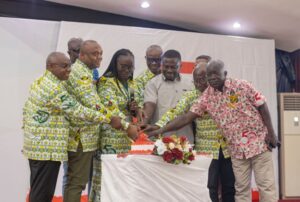The Deputy Minister for Finance, Thomas Nyarko Ampem, has reaffirmed government’s firm commitment to strengthening health education and improving healthcare infrastructure in the country.
He made this statement at the 50th Anniversary celebration of the School of Medical Sciences (SMS) at the Kwame Nkrumah University of Science and Technology (KNUST) in Kumasi last Thursday.
Speaking before an audience of academics, students, health professionals, and government officials, Mr. Ampem highlighted that the 2025 Budget, which was recently passed by Parliament, allocated more than GH¢2 billion to healthcare infrastructure development from now until 2028, a move that will help strengthen health infrastructure in most part of the country.
“As a government, we understand that quality healthcare begins with quality training. That’s why in the 2025 budget, we have committed over two billion cedis towards healthcare infrastructure between now and 2028,” he said.

He revealed that GH¢200 million of this amount will be spent in 2025 alone on critical infrastructure projects, including support for institutions like the KNUST School of Medical Sciences.
“Specifically, in 2025, GH¢200 million has been earmarked for vital projects such as what you are about to start here. These investments are not just numbers—they represent lives saved, health restored, and futures secured,” the Deputy Minister stated.
Uncapping Health Insurance for a Healthier Ghana
Mr. Ampem also disclosed a major policy shift in the administration of the National Health Insurance Scheme (NHIS), one that is set to provide significant relief to Ghanaians.
He said the National Health Insurance has been uncapped with a GH¢9.9 billion allocation for key interventions such as the Free Primary Healthcare programme and the Ghana Medical Care Trust also known as Mahama Cares.
“These initiatives reflect our dedication to ensuring that every Ghanaian, regardless of income level or location, has access to quality healthcare,” he added.
The Mahama Cares programme, a flagship initiative under the incoming administration’s health agenda, is expected to roll out in phases, focusing on strengthening primary healthcare delivery, especially in underserved communities.
*A Call for Deeper Investment in Medical Education*
The 50th anniversary of the School of Medical Sciences at KNUST was not only a celebration of five decades of academic excellence and medical training but also a platform to highlight the urgent need for strategic investment in medical education.
In his welcome address, the Dean of the School, Prof. Christian Agyare, emphasized the critical role the institution has played in producing doctors, researchers, and healthcare professionals who serve both Ghana and the wider sub-region. He noted, however, that the demand for medical professionals continues to outpace the supply due to limited infrastructure, equipment, and training resources.
“Our school has come a long way in 50 years, but the challenges of today require bold and intentional support from all stakeholders, particularly government. We cannot solve the country’s healthcare deficit without first solving the problem of inadequate training facilities and resources,” Prof. Agyare stated.
Future Prospects
In a timely assurance, Mr. Ampem pledged to the university community and Ghanaians at large that government remains committed to working closely with academic institutions, health practitioners, and development partners to expand access to medical education and modern healthcare delivery.
“The Government of Ghana sees the KNUST School of Medical Sciences not just as an academic institution but as a national asset. We will continue to support your growth, because when you succeed, Ghana’s healthcare system succeeds,” he emphasized.










